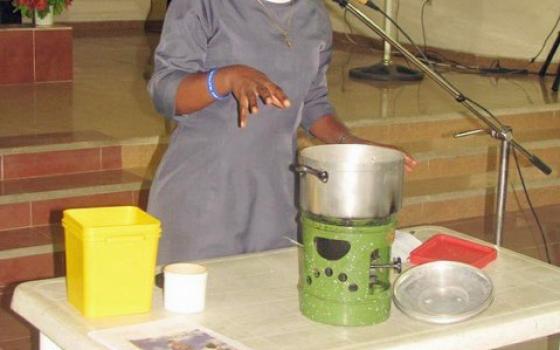As a Religious Sister of Charity, I have been privileged to serve in five Nigerian prisons, and to find creative ways to help the prisoners there. One of the most gratifying outcomes is to see prisoners who are self- reliant upon their release.
My introduction to prison ministry began in 2008 as a Youth Corps member, in which I facilitated the release of over 20 inmates and helped resettle them with their families in a project called "Prison Decongestion." After entering the convent and having a time of formation, I began working full-time in the prisons.
Now I go daily to three prisons in Lagos, two for men and one for women. One of these prisons has 3,580 inmates! This ministry is a combination of teaching and training to give the prisoners empowerment skills, in the hope that they can be self-employed when there are no other jobs. My goal is to make them self-reliant and independent, so they will not return to a life of crime.
In one of the prisons, the authorities buy chemicals so the inmates can produce disinfectant to keep the cells clean and disease-free, and insecticides to kill the abundant mosquitoes.
One of my classes is instruction in how to produce petroleum jelly, and Dettol (a topical antiseptic liquid), which can be used as a disinfectant, toilet cleaner, air freshener, or as a liquid laundry soap. They have also learned how to make bleach and spray perfume.
I also teach classes in French and English, and help prepare them to take their GC Advanced Level Examination (a secondary school certificate examination). Inmates who are qualified teachers also teach in the prison schools, which run from kindergarten to university level since some prisoners have never been to school. Computers are available to teach computer skills, but the electricity is unreliable.
Imagine what hope this training gives the prisoners for the day they are released!
Another of my joys is to assist the chaplain by offering Communion services, giving reflections on the readings of the day, working with prisoners who are trained catechists, and coordinating classes to prepare prisoners to receive the sacraments. I also teach them how to make rosaries!
The highlight of my ministry and the most enjoyable task is to listen to them. It lifts their spirits, puts a smile on their faces, and gives them encouragement and hope. There is a longing for a listening ear.
Whenever I can, I share food with them. The government provides little or nothing to eat, and most food comes from nongovernmental organizations or churches. Prison chaplains and most of the parishes in the Lagos Archdiocese help in meeting some of the prisoners' needs for food or other necessities.
The greatest challenge is finding legal assistance, which is very expensive, although there are a few pro bono lawyers. I have gone to court with prisoners, standing up on their behalf (sometimes crying), even though I am not a lawyer.
There are joyful moments, as when inmates are released, or at celebrations like feast days or Dec. 26. That is the day the archbishop comes and celebrates Mass, and candidates receive the sacraments. Parishioners supply Christmas gifts, food and drinks.
I am happy to say that Moslem and Protestant inmates also benefit from the celebrations, the free medication and education, the transport home when they are released, and other help supplied to the Catholic inmates.
The advice that I would give a young sister just starting into prison ministry is to establish a cordial relationship with the prison authorities; working with them makes it a lot easier, because you need their permission for everything. Abiding by the rules and regulations of the prison is also essential.
I have encouraged newcomers not to get carried away with pity. Those who work in prisons receive endless requests from prisoners, and I used to cry and feel their situation very deeply. I have learned through experience that if you don't control your emotions it can get you into trouble.
I want people to know that not all prisoners are criminals, and that showing them love will go a long way in reforming them for a better future. I am hoping for free legal aid for the innocent; good food; a healthy environment; good, free medical help; and an improved judicial system where prisoners will not await trial for six years or more.
[Edna Kotse Ikalumhe is a Religious Sister of Charity from Afashio Uzairue in Edo State, Nigeria. After graduating from Ambrose Ali University with a Bachelor of Arts in French, she served in the National Assembly in Abuja. In 2009 she entered the Religious Sisters of Charity. After making her first profession in 2013, she was assigned to prison ministry.]

